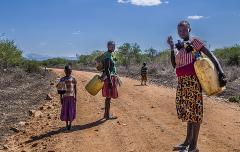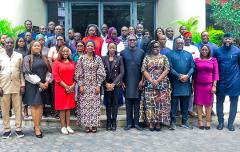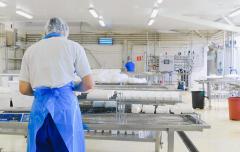Efficiency and cooling experts gather in Rwanda to discuss sustainable cooling access
Cooling for All Global Panel holds second meeting ahead of upcoming flagship report
Cooling and energy efficiency stakeholders, business leaders, policymakers and experts met recently in Kigali, Rwanda to discuss the growing urgency for sustainable solutions to meet global needs for cooling in an increasingly hotter world.
The Africa Cooling Efficiency Conference, hosted by the Kigali Cooling Efficiency Program (K-CEP) and Rwanda’s Ministry of Environment, looked at cooling initiatives at the national level, as well as how the East Africa region can maximize energy efficiency by sharing best practices. The conference was held as a follow-up to the 28th Meeting of Parties to the Montreal Protocol, which took place in Rwanda in 2016 and resulted in the Kigali Amendment to phasedown the use of HFCs – a potent greenhouse gas used widely in air conditioners and refrigeration.
Cooling solutions include not just air conditioners but other systems and products that are essential parts of everyday life – from cold supply chains for fresh produce to safe storage of life saving vaccines and medicines. With traditional technologies, growing needs for cooling create the risk of a significant increase in energy demand and more polluting emissions.
Delivering the opening keynote address at the conference, Dr. Vincent Biruta, Rwanda’s Minister of Environment, said: “As governments, we have a responsibility to put in place regulations that promote energy efficient equipment, both at home and for industry. We also know that the best time to invest in improved energy efficiency is when one is making the decision of which equipment to buy. That’s why we need to move quickly to set the standard, and explain the benefits to consumers in a language they understand.”
The event, held in in partnership with the Rwanda Environment Management Authority, UN Environment, UN Development Programme, and GIZ, the Germany agency for international cooperation, highlighted initiatives underway, such as national cooling strategies and energy performance standards, and examined lessons learned to date. These ranged from consumer savings to improved efficiency and reduced environmental impacts of cooling products.
Rachel Kyte, Special Representative to the UN Secretary-General and CEO of Sustainable Energy for All (SEforALL), focused her closing remarks at the conference on Cooling for All, the initiative launched by SEforALL last year to identify the challenges and opportunities of providing access to affordable, sustainable cooling solutions for all: “Cooling for All thinks about the last mile first, those who traditionally get left out of energy services and utilizing cooling systems. We cannot leave them vulnerable.”
Other key themes discussed at the event included:
- The need to think about cooling in the context of solar home systems and how they could be designed to include refrigerators and fans.
- How Africa’s energy planning process might consider the need for sustainable cooling solutions in greater detail.
- The need to harmonize Minimum Energy Performance Standards (MEPS) to reduce the burden on business and also support better enforcement between African countries.
- Cooling needs 'systems leadership' to link up the various institutions required for success - Ministries and agencies for the environment, energy, infrastructure, finance, health and trade, customs, and standards.
- The need to think of energy services in the context of meeting peoples’ needs, not just electrons delivered.
Directly after the conference, the Global Panel on Access to Cooling met to discuss the upcoming flagship report from the Cooling for All initiative.
The Panel, first convened by SEforALL in 2017 and with members from organizations including UN Environment, K-CEP, Danfoss, UNDP and many others, was developed as part of the Cooling for All initiative to spur action and leadership in increasing access to integrated sustainable cooling solutions.
The report, due for release at the UN High-Level Political Forum in July, will, for the first time, produce a comprehensive overview on the challenges and opportunities of providing sustainable cooling access that can reach everyone. This will include evidence-based recommendations to help create a pathway to ensure that the poorest countries and their citizens, who are often disproportionality affected, can have sustainable access to cooling solutions.
Cooling for All’s work is creating a direct intersect between three internationally agreed goals for the first time: the Paris Climate Agreement; the Sustainable Development Goals; and the Montreal Protocol’s Kigali Amendment.
Find out more about Cooling for All here and follow #CoolingforAll online.



